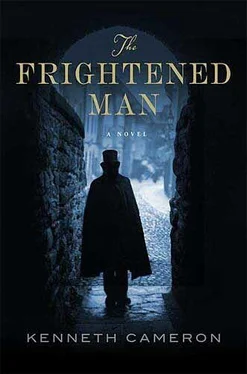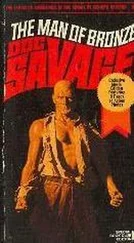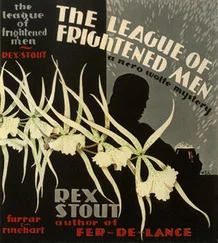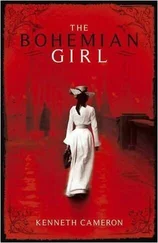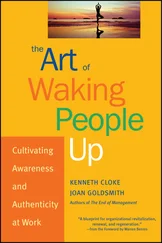Kenneth Cameron - The Frightened Man
Здесь есть возможность читать онлайн «Kenneth Cameron - The Frightened Man» весь текст электронной книги совершенно бесплатно (целиком полную версию без сокращений). В некоторых случаях можно слушать аудио, скачать через торрент в формате fb2 и присутствует краткое содержание. Год выпуска: 2009, Жанр: Детективная фантастика, на английском языке. Описание произведения, (предисловие) а так же отзывы посетителей доступны на портале библиотеки ЛибКат.
- Название:The Frightened Man
- Автор:
- Жанр:
- Год:2009
- ISBN:нет данных
- Рейтинг книги:5 / 5. Голосов: 1
-
Избранное:Добавить в избранное
- Отзывы:
-
Ваша оценка:
- 100
- 1
- 2
- 3
- 4
- 5
The Frightened Man: краткое содержание, описание и аннотация
Предлагаем к чтению аннотацию, описание, краткое содержание или предисловие (зависит от того, что написал сам автор книги «The Frightened Man»). Если вы не нашли необходимую информацию о книге — напишите в комментариях, мы постараемся отыскать её.
The Frightened Man — читать онлайн бесплатно полную книгу (весь текст) целиком
Ниже представлен текст книги, разбитый по страницам. Система сохранения места последней прочитанной страницы, позволяет с удобством читать онлайн бесплатно книгу «The Frightened Man», без необходимости каждый раз заново искать на чём Вы остановились. Поставьте закладку, и сможете в любой момент перейти на страницу, на которой закончили чтение.
Интервал:
Закладка:
‘I am about to perform a post-mortem examination on the body in a police matter of a victim named Sarah Minter.’ The accent was upper-class, the voice accustomed to inspiring awe.
The man with the notebook said something. Parmentier frowned. ‘ Stella Minter,’ he said. He let several seconds pass. Then, deliberately, he selected a bone-handled scalpel from the tray of instruments, turned back and in one swift gesture strode to the table and whipped the cloth aside. The rubber gloves, coming high on his arms over his coat sleeves, gave him a vaguely rakish look, the gauntlets of a pirate or a highwayman, at odds with his clothes and his voice.
Denton, like others, gave no outward reaction when the body was exposed, but, to someone standing close and looking directly at him with a good light, he could have been seen to narrow his eyes, a kind of blink; looking closer, a dilation of the pupils would have been visible. The widespread effort to show no reaction made the theatre quite silent as even breathing stopped.
Stella Minter lay on her back, nude, legs together, head sticking a few inches beyond the end of the table so that her light-brown hair fell back and down and the slash across her throat gaped. She was painfully thin; her ribs showed clearly; but her breasts, flattened by her position, were nonetheless large, the aureoles dark. Her skin was greenish-grey, the light unkind to it; she had no hint of warmth, of the pink that is life. Using a cheap pair of opera glasses picked up on the way, Denton could see the curled, grey-brown edges of wounds on her breasts and abdomen. Two inches below the navel, the abdomen was open, and unidentifiable organs lay on her joined thighs, as grey now as pickled specimens. Denton counted eleven wounds on the upper half of the torso. Visible blood was brown but very scanty; the body, he thought, had been washed. The bloody sheets of his wedding night. Not a lot, but it seemed so, his new wife in tears, wanting to wash the sheet before it was discovered. So much of women was about blood .
‘The subject is a woman, somewhat but not excessively undernourished, height-’ Parmentier gestured; the assistant handed him one end of a tape, and Parmentier walked to the feet. The assistant muttered to him. ‘Five feet, four and one-quarter inches.’ He let go of the tape. ‘Age-’ He walked to the middle of the body, felt over first one hip and then the other; walked to the head, felt the top of the head; returned to the middle and leaned over the pubis, apparently studying the rather sparse, sandy hair. ‘Perhaps sixteen or seventeen; if we had time, we would excise one tip of the pelvis to study bone growth.’ He started again for the head and paused at the breasts, again leaned forward until his eyes were directly above the right breast. With his left hand, he touched the nipple, rubbed the tips of the fingers together, sniffed them, then leaned still farther and examined the other breast. ‘Evidence of lactation in both breasts, which also appear to be engorged.’ He straightened. He looked halfway around the circle of men. ‘What does this suggest to us, gentlemen?’ He waited and waited until somebody at last said in a gruff but hesitant voice, ‘Had a baby?’
‘Recent parturition, exactly, albeit crudely put. We speculate tentatively that subject has given birth within perhaps six months.’
He continued up to the head and examined the face, then the top of the head, parting the hair with one hand. The assistant made measurements — circumference of the skull, eye-line to back of the head, ear-to-ear width.
‘I find two contusions on the right side of the face, one on the maxillary, one two inches lower.’
Denton studied the face through the glasses. The bruise on the cheekbone was blue-grey. He hit her and hit her.
Parmentier straightened. ‘In certain cases, we would remove the cranium.’
He took a step backwards and spread his hands a little wider than his hips; the scalpel caught a light, winked.
‘The subject has been virtually exsanguinated,’ he said. ‘Exsanguination was undoubtedly the result of wounds visible even before examination — as you can perhaps see. However, as to which wound was the principal cause-’ He raised his heavy eyebrows. ‘Note the throat.’ He touched the body again, this time at the tip of the small chin. Pushing with one finger, he tried to force the head back; when it would not move because of its position on the table, he signalled to his assistant, and the man took the shoulders and drew the body a few inches towards him. The wound gaped wider and the head sank back. The surgeon probed the cut with a finger, then forced the head farther back still, reaching in with his left thumb and index finger. ‘The right carotid artery has been severed, as we suspected — reason enough for exsanguination, but — ’ he straightened and gestured with his scalpel — ‘we must never speculate.’
— and he cut her -
He put his eyes close to the wound and worked in it with his fingers. ‘Wound is deepest on victim’s right side, slightly less so in the centre, suggesting a cut from right to left that also tended somewhat downwards, exiting through the left sternocleidomastoid muscle, where I can follow an increasingly shallow incision that ends in a faintly jagged tear hardly visible to the naked eye. I deduce that the point of a blade was inserted on the right, then pulled across — not, let me say, the cut with the long edge of a blade that is suggested by the vulgar gesture of drawing the finger across the throat.’ He then made measurements with a flat ivory or bone instrument — Denton couldn’t tell which — that gave imperial measurements for what he had just said. The deepest thrust, on the right, had gone in more than three inches, actually striking into a vertebra. Parmentier measured the stabs in the torso with the same showy precision, counting fourteen, the deepest five inches. ‘Nine of these wounds show abrasion beyond the edges of the wound itself, in five of the cases the same pattern of ridges parallel with the blade. I take these to suggest — suggest, gentlemen, not prove, not yet — that a large clasp knife was used that, when thrust to the full depth of the blade, brought the end of the handle, and hence the bolsters, into violent contact with the skin, leaving the ridged patttern I have noted — that is, the marks of the bolsters.’
Then, for the first time, he used his scalpel. With one sweep, he cut the torso from the breastbone to the navel. Denton, with even his minimal knowledge of orchestral concerts, was reminded of a conductor. ‘In the event, what I am now doing is probably redundant, but it pays to be sure. We want to know that the victim did not die of poison or internal damage or any of the vicissitudes that await the human body.’ He handled a lung, cut a slice from it, then straightened, the tissue resting on his left palm. ‘The victim was in relatively good health, in fact, with no outward sign of disease to the lungs or stomach. I shall of course do the kidneys and liver separately. If enough blood remains in the spleen, as I expect it to do, we shall take a sample and test it for the grosser poisons.’ He handed over the piece of lung without looking towards the assistant. A slight smell of something like sewage spread through the theatre.
‘Now-’ The surgeon moved down the body. He was still immaculate, had not rolled up his sleeves or put on an apron, as his assistant had. Again, he held the scalpel up as if it were a cautioning finger. ‘To the organs that most interest the police.’ He looked down at the mass of tissue lying on the thighs and at the brutal gashes above it. ‘A crude semi-oval of approximately six inches by four inches has been cut, or perhaps I should say hacked in the abdomen, penetrating the muscle wall and damaging the intestines, although they were not, I believe, the goal.’ He was probing the terrible wound. ‘The spleen is untouched, sheer happenstance. Small intestine is perforated in at least three places, slashed right through in at least one; this isn’t our primary concern. Rather than damage to these organs, what has been so crudely attempted is an excision of the womb, cutting it — or perhaps tearing it, I cannot yet tell — loose from its connections so that it could be exvaginated through the vulva. In short, the most primitive sort of methods have been used to, as it were, surgically remove the most female parts of the body.’
Читать дальшеИнтервал:
Закладка:
Похожие книги на «The Frightened Man»
Представляем Вашему вниманию похожие книги на «The Frightened Man» списком для выбора. Мы отобрали схожую по названию и смыслу литературу в надежде предоставить читателям больше вариантов отыскать новые, интересные, ещё непрочитанные произведения.
Обсуждение, отзывы о книге «The Frightened Man» и просто собственные мнения читателей. Оставьте ваши комментарии, напишите, что Вы думаете о произведении, его смысле или главных героях. Укажите что конкретно понравилось, а что нет, и почему Вы так считаете.
